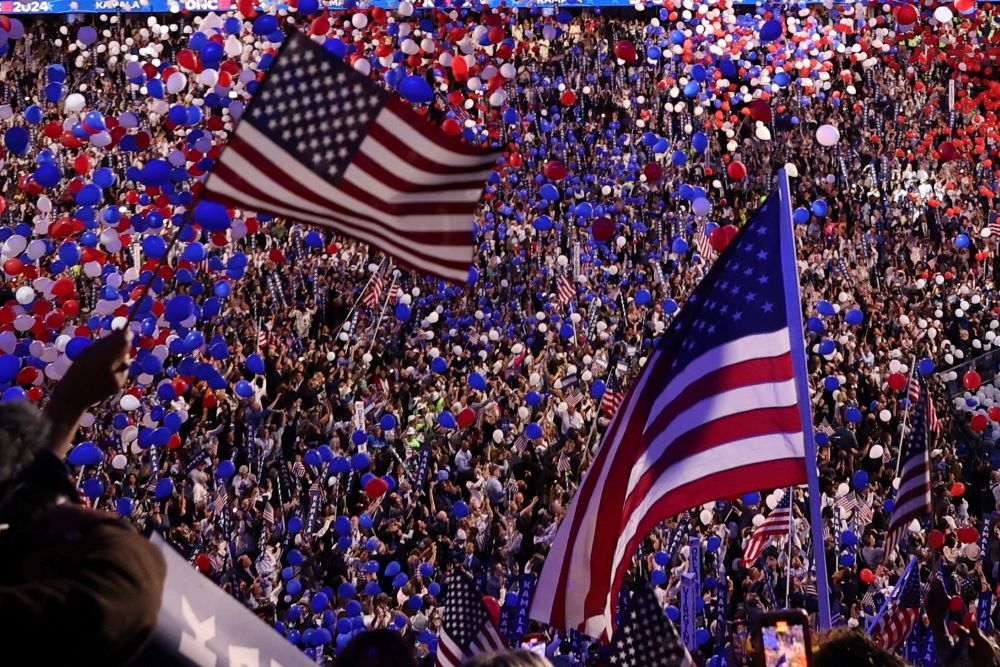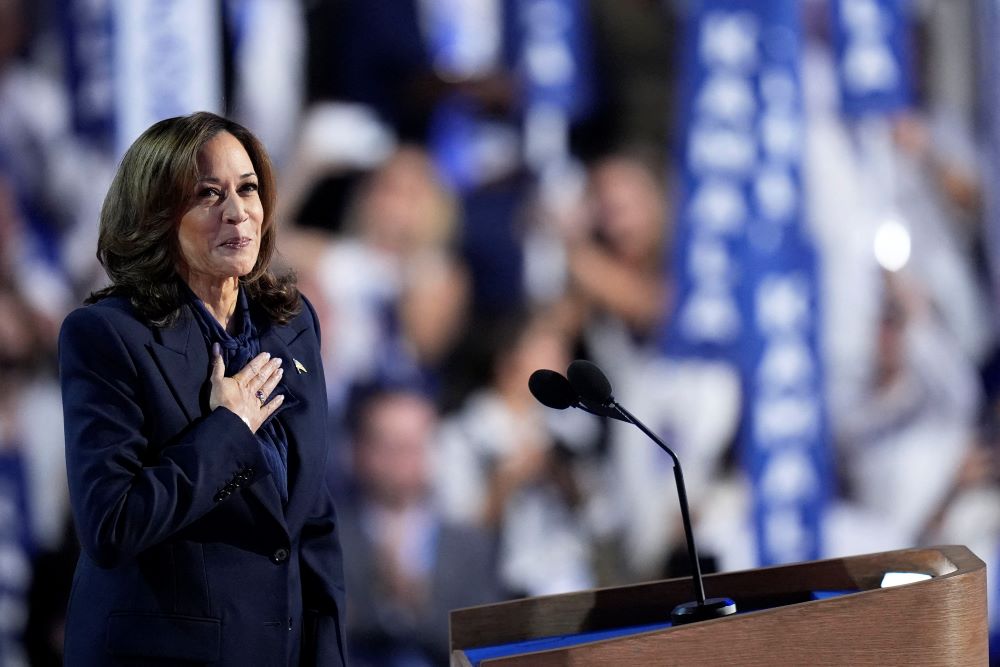
U.S. flags and balloons fill the United Center after Vice President Kamala Harris, the Democratic presidential candidate, gave her acceptance speech during the Democratic National Convention in Chicago Aug. 22. (OSV News/Reuters/Brendan Mcdermid)
Walking away from the Chicago United Center after Kamala Harris' acceptance speech, it would have been hard to know we were not leaving a late summer night at the ballpark where the White Sox had eked out an all-too-rare win. Music played. The police smiled and laughed with the crowd. Protesters were there to demonstrate against the Biden-Harris administration's support for Israel — yet even they mingled amiably with the departing Democrats, their "Justice for Gaza" signs jostling with long "Kamala" convention signs crowded all together into the same Green Line El train.
Joy was the message of the 2024 Democratic National Convention, but this year's convention offered something rare in political life. While "Joy" was a messaging strategy concocted by a room full of consultants as surely as "Hope and Change" was in 2008, joy succeeded to be more than an aspiration or a manufactured image during the convention. Joy was the unmistakable and unavoidable quality of the entire event. And, joy seemed to have arrived all on its own.
The weather helped. Breezy blue skies and comfortable temperatures transformed the long walks to the United Center and the snaking outdoor security checkpoint lines into cheerful mingling opportunities with strangers who were, to a person, joyful. But even where we couldn't feel the weather, we could feel the energy.
Because it is unpredictably unreliable, joy is a thin reed to support a presidential campaign.
Midway through the night, while trying to reach the convention floor, I wandered into a lounge with an open bar just off the stage, a "cloakroom" for the DNC Host Committee. It's entirely probable that the party was not meant for me. But, emboldened by joy, I grabbed a drink and chatted with some of the revelers from all over the U.S. before two experienced campaign workers invited me to join them in a booth with a good view of the entrance.
While proudly showing off their selfies with Oprah, they confided that VIPs transited through this area on the way to and from their speeches. They had camped out shrewdly. Our conversation turned to the energy of this convention. "I've never seen it like this before," one said. The other nodded agreement. Something was happening in Chicago. Laughing and draining their bourbon ginger cocktails all around us, the old, experienced political hands in that private DNC party just off the stage were more sure than anyone.
The fire marshal agreed, too. Word came once I returned to the convention hall that the city had closed the building. At capacity with probably more than 21,000 people inside, no one else would be admitted to the United Center. "They oversold!" someone said. The building was bursting, and the prime-time hour had arrived for the convention's main event.

Democratic presidential nominee and U.S. Vice President Kamala Harris reacts during the Democratic National Convention at the United Center in Chicago Aug. 22. (OSV News/Reuters/Elizabeth Frantz)
Adam Kinzinger, former Republican congressional representative from Illinois, would name an important theme for the evening in one of the night's best-received speeches: "Republicans, you belong here too because democracy knows no party." The delegates' thunderous response confirmed how much power that idea can have across the campaign season. The welcome mat is out — Republicans can come in. Yet I was struck by how genuinely strange all this was — to be at the Democrats' convention where Republicans were welcomed in an unapologetically patriotic spirit because all of us know how dangerous the Republican Party has become. There has not been a test of our political system at the ballot box like this since 1864. The danger is so real that it was the theme of a prime-time appeal to middle America. And yet, the party went on. That collision of grim reality with rapturous celebration began to tinge the evening in unreality for me. The unreality is worrying.
It would be as wrong to underestimate the power of all this joy in a political campaign as it would be hard to quantify. Joy is boundless, it is expansive. Its synonym, "ebullience," arises from an image of boiling over (ebullire). Joy is as contagious as a virus and, while perhaps it can be harnessed briefly, joy is not really under anyone's control. Joy must be spontaneous or it is not joy. And, because it is unpredictably unreliable, joy is a thin reed to support a presidential campaign.
Advertisement
The week's gestures of gratitude toward Joe Biden were reminders of the remarkable achievement this convention represented, switching focus in scarce weeks. They also reminded us that we are at the end of the beginning of the nascent Harris-Walz campaign. All this joy arises from relief that, suddenly, the yearlong campaign slog repeating the campaign of 2020 — a year everyone dreaded — is over. Joy arises, in that way, mostly from Kamala Harris not being Joe Biden. But with 75 days between the end of the convention and Election Day, the challenge to sustain the engagement this joy has won for Democrats hinges on defining Kamala Harris as a candidate and a national leader, herself.
The convention made a beginning. But Harris' acceptance speech made it clear that establishing Harris in this way will be a big task for a mere 75 days. Quite a lot of Harris' speech was given to the sort of introductions and storytelling that would not have been needed had she been on the top of the ticket since last year. Even more worrying, apart from all that time devoted to introducing herself, the real star of her speech was Trump, named 17 times in a 35-minute speech.
As much as it will not be enough for Harris to be not Biden, it also does not offer voters enough for her to be not Trump even at this late moment in the Trump era. Much of the evening was spent counterpunching Trump with reminders about reproductive rights, his enthusiasm for autocrats and Project 2025. Very little of the evening told us what our politics could be without Trump — except for the joy we might feel if he were banished from public life for good. Voters will need more. They will need a good, clear idea about Kamala Harris' vision long before Nov. 5.
Those campaign veterans I spoke with in the lounge were right — it has never been like this before. Never before has a nominee been replaced midsummer, mid-campaign in this way. Never before has a candidate for president had so little time to catch up and tell us how she wants to lead the United States into our future. The challenge is far greater than it seemed in the cheerful convention hall on Aug. 22. The challenge should not be underestimated no matter how much joy we are feeling.
Gazing down at the delegates packed on to the floor of the United Center, I saw a snapshot of America. Every state, every territory, every race and ethnicity and belief system had come together as strangers on Monday, Aug. 19. By Thursday, they had become a community. A bit like a political "Brigadoon," they winked into existence like a village from out of time. They lived in a joyful place where gun violence was curbed, reproductive freedoms were secured, our basic institutions were respected, and Trumpism had ended. Now that their village has disappeared, the question lingers — did they visit us from our future or from our past?







